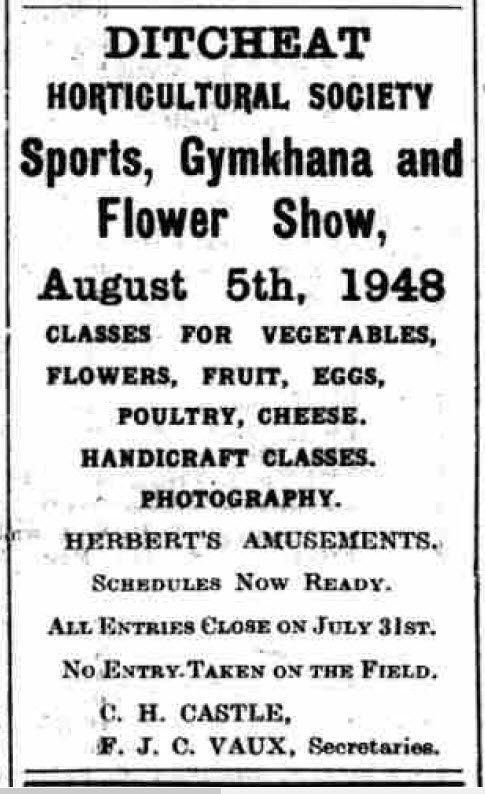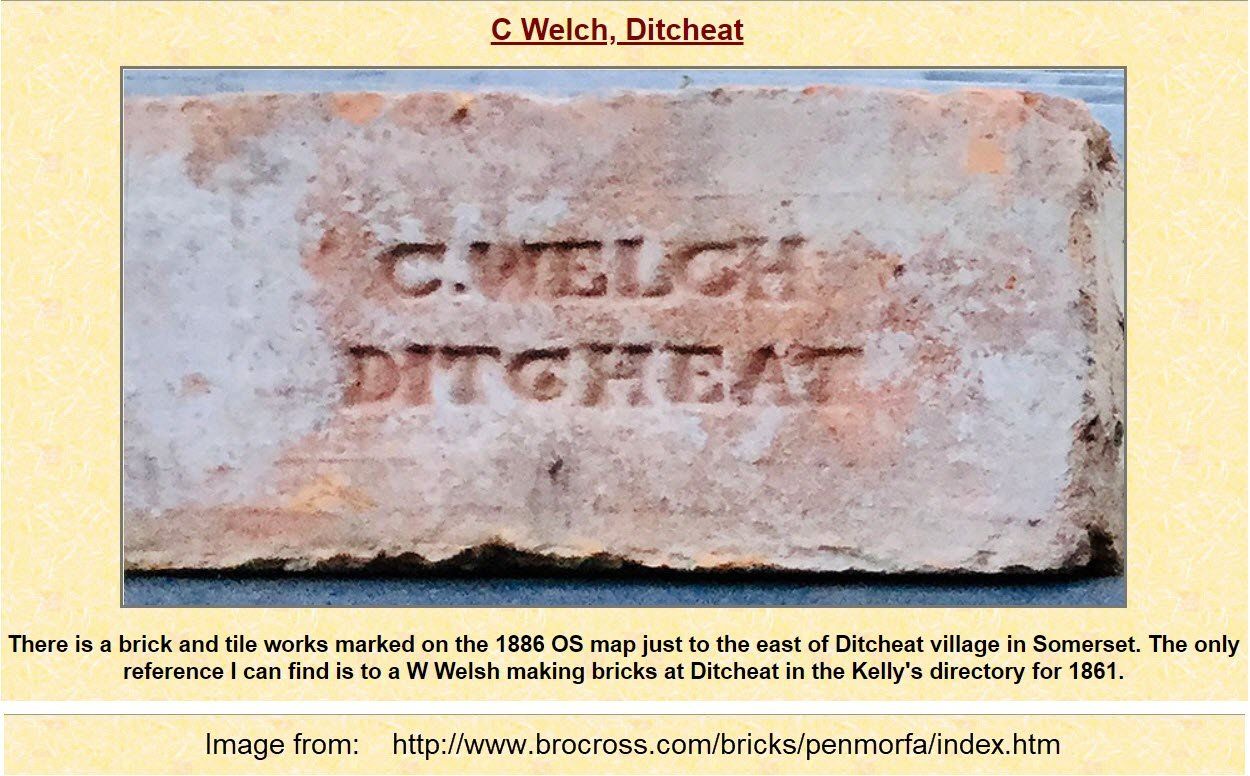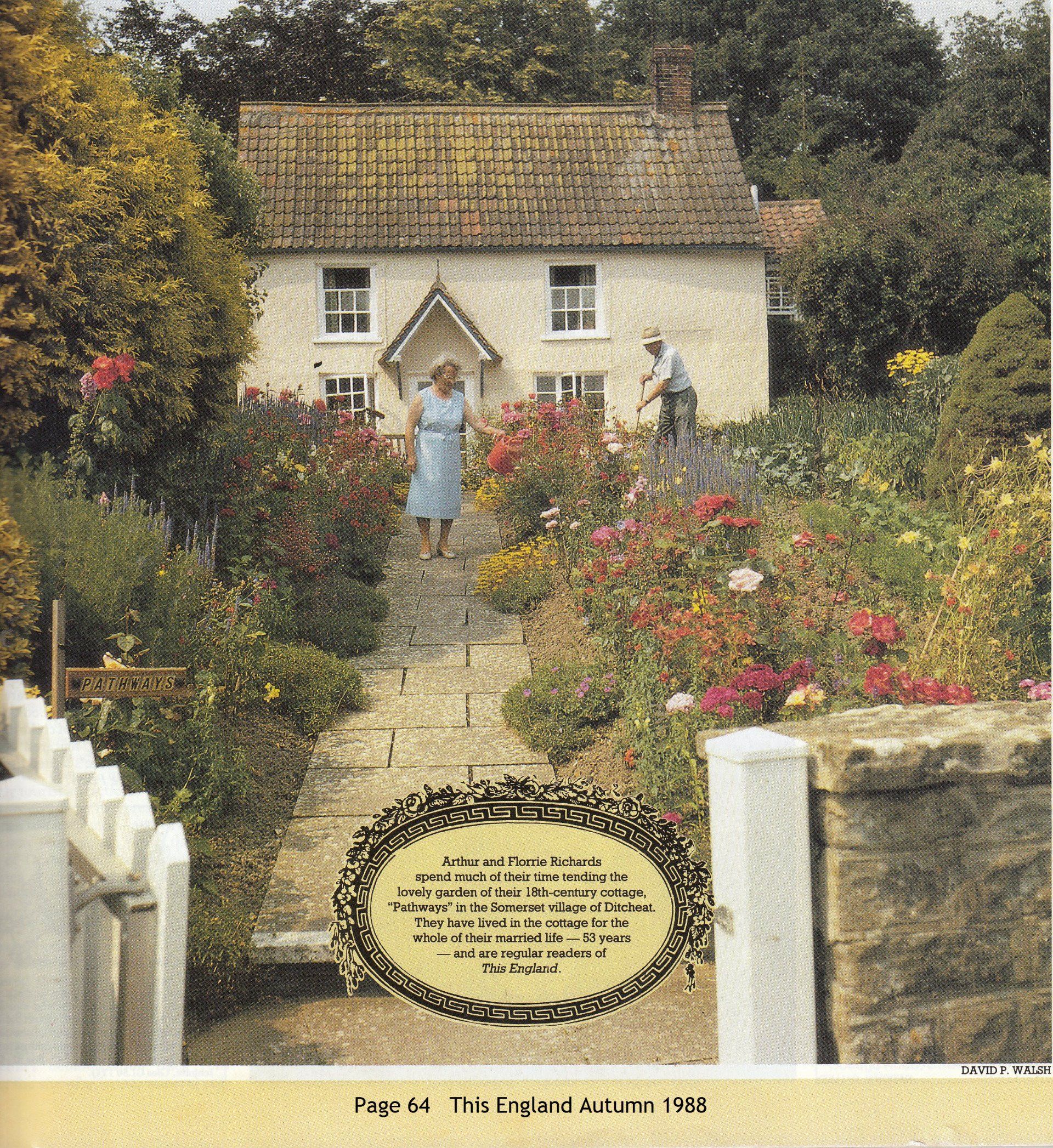Ditcheat Life Blog

News paper report of the 1948 Show This blog post is prompted by my visit to the 135th Hawkesbury Horticultural Society Show in South Gloucester, it is believed to be one of the longest continuously running Horticultural Shows in England. From its start in 1885, to the 134th Show in the summer of 2019, it had been held every year without a break. The Ditcheat Show folded in the early 60's . This report is of a show that I cannot remember, being not quite 1 year old. However, I do recall many of the shows in my childhood and competed in the children's section.

This post was prompted by a response to this website from Denise Graham, she wrote "Both my husband & myself worked for John Wainwrights over at Stoke St Michael, Many years ago a large brass 'nut' was found (for the wheel of a horse drawn stone waggon). It is stamped with "Ditcheat Waggon Works Shepton Mallet(t). ? Padfield & Son(s). It has been 'persuaded' on and off with a chisel, so some letters are unclear. Would you know any history of Padfields Waggon works? " During my childhood the business in the centre of Ditcheat was run by Mitchell & Hill Builders & Undertaker, wheelwrights, smithy and wagon building had stopped. Although I remember the Tyring Platform present in the yard. The first record I found from the newspaper archives dated January 1890 is of William Hodges advertising for a blacksmith.

A few people will remember the dilapidated wall along the Grove footpath pre 1992, when you could just step over a pile of stones into the orchard. It was not economical to repair as far as the agricultural use would justify and the ownership was questionable, a problem that was often raised at Parish Council. One day when Norris Yeoman was cleaning along the path surface and edges a car pulled up at the end and this chance meeting led to the wall being rebuilt. The gentleman was a representative of Bovis and was looking for projects to put forward for the government's Employment Action scheme, where unemployed people would volunteer minimum of 32¼ hours per week and receive £10 per week over and above their DSS benefits. A scheme was approved and the Parish Funded the materials with contribution from the farmer, Earnest Dyke. A large van body was purchased and used as a site store and cabin. There was a set back when the men's tools were stolen from the lock up store. The next night the hired mixer was also stolen. A villager loaned his mixer, more tools were forthcoming and within a few days £365 was collected in the village to replace the original tools.

The quarry was in existence since from about 1870 and was generally described as producing “Blue Lias Lime and Selenitic Cement”, but in Kelly’s Directory of 1902, it also claims Portland cement. The opening of the quarry quickly followed the completion of the Burnham to Evercreech section of the Somerset & Dorset Railway in 1862 During the next 40 years the quarry was operated by a number of owners, this page reproduces advertisements and newspaper reports of events and court cases. It is interesting reading and is an insight to the industrial heritage in Pylle and the local area. The newspaper reports were researched from www.britishnewspaperarchive.co.uk with additional information from www.cementkilns.co.uk/cement_kiln_pylle.html Maps are found at The National Library of Scotland which has more editions of OS maps including the First Edition maps from 1884, use this link ,

Examples of Ditcheat bricks stamped "C Welch" can be found in a number of walls around the village. The location of the brick works is shown on an 1884 map available at https://maps.nls.uk/view/106022273 The works are missing in the 1928 revision https://maps.nls.uk/view/101461624 The area worked covered the whole of the site now occupied by the houses on the east side of Folly Drive. Clay was excavated to the level of the rear gardens right up to the front gate of the present houses. The houses are build on made up ground, mostly with the surplus trench spoil arising from the installation of mains drainage in the village around 1958.

Shepton Mallet Journal - Friday 05 February 1926 Image © Reach PLC. Image created courtesy of THE BRITISH LIBRARY BOARD. DITCHEAT. Farewell Gathering. —A very pleasant evening was spent at the Green tree Inn,” on Friday last, on the occasion the departure of the Post Office Linesmen, who have, for this last three months, been residing in the village during the installation new lines. Mr. George Merrifield, speaking for the villagers, said that the company the linesmen would be greatly missed, and that if they should happen to return to the district at some, future date, they might be sure of very hearty welcome. Mr. Bert Lockyer, replying on behalf the linesmen, spoke highly of Ditcheat hospitality, and .said that they would always live in the hope of returning to the village, if only for short stay. The Ditcheat Jazz Band, which was in attendance during the evening, and rendered excellent music, was ably led Mr. Herbert Mintern.

The home of Florrie & Arthur Richards (Florrie was Norris Yeoman's elder sister) Mrs Richards was known to many as the lunch time supervisor at Ditcheat School. Arthur was a signalman at Evercreech Junction South at the time of the closure, he then was painter and decorator for Mitchell & Hill the village builders.

CHEESE packed by a new vacuum process machine at Castle Cary – there are only seven such machines in the country – was on sale at the National Dairy Council's June Dairy Festival which was opened at Weston-super-Mare on Saturday. The vacuum packed cheese is marketed by Mr. G. L. Churchhouse, of Manor Farm, Castle Cary, in the name of Castle Cary Dairy Products, Ltd. Mr. Churchhouse was there on Saturday, supervising his stand in the Dairy marquee. He was one or a number of Mid-Somerset people who had an interest or who were taking part in the show. Cheese-making equipment for cheese-making demonstrations was loaned by Mr. F. Isgar, of Wainbridge. Mark, and Mr. David Hilton, of Ham Lane, Pottery. Compton Dundon, was there with his potter's wheel. ONE AT DITCHEAT Mr. Churchhouse. whose vacuum packed cheeses proved an interesting item, explained to our reporter that only three of the seven packing machines in the country were owned by farmers and two were in, the Mid-Sonierset area—at Castle Cary and on Messrs. Barber Brothers farm at Ditcheat. WEEK'S PROGRAMME Mr. Churchhouse sells his own Cheddar cheese, as well as other makes. retail and wholesale. The week's programme of the Dairy Festival be on Saturday with a reception given by the Festival committee. A member of the National Milk Publicity Council. Mr. D. J. Vogler, told the gathering of some 300 people at the reception in the Winter Gardens that the dairy industry is one of the largest single food industries in the country. BEST IN COUNTRY It had a turnover of £5OO million a year and four million gallons of milk was sold every day. In fact so much milk was being sold that five pints per head of the population was bought every week. "We shall soon have seven pints a week—one a day—and then we shall have to have a slogan to replace “Drinka Pinta Milka Day” he said. Miss K. D. Maddever. of the Ministry of Agriculture and Food said the Weston Festival was the finest in the country. The Mayor of Weston. Councillor E. B. Moore. reminded his audience of how the Festival had grown and paid tribute to the organisers. This is Weston's seventh Dairy Festival. OPENED BY MAYOR Later the Mayor opened the Festival which covers week of activities. There arc daily demonstrations of cheese-making, milking. feeding of calves and piglets and many other attractions, including a ploughing match on the sands. Throughout the Festival music is being provided by military bands and on Tuesday the major offering was a helicopter rescue demonstration by the Royal Navy. Yesterday (Wednesday) was Young Farmers' Day with children's sports and a tug-o'-war competition. CARNIVAL To-day (Thursday) is the day of the big Weston Carnival. The Festival ends on Saturday with an open gymkhana. as one of the attractions.

Jack Albert Lintern, hairdresser. Rectory Cottage, Ditcheat, was charged at the instigation of William Tylcr, of the Investigation Branch G.P.0., London, with obtaining £4/9/9 by means of forged instrument, a falsely date stamped betting letter, on 5th September. 1929. at; Ditcheat. There was a second charge against him for endeavouring to obtain £5/8/1 by means of a forged instrument falsely date stamped lettering letter. 27th September, 1929, at Ditcheat, and a third in regard to a similar offence at Ditcheat on 29th September, 1929, when the amount attempted to be obtained was £l2/9/6. In respect to the last case similar summons was issued against Frederick Ward, labourer. 6, Prospect Villas, Ditcheat. Mr. F. W. Willmott, solicitor, of Taunton, appeared to prosecute on behalf of the Postmaster General, and Mr. W. F. Long, of Bath, was with the defendant. By the consent of all parties the cases were taken together. In outlining the cases at length, Mr. Willmott said the method adopted by Lintern was to get 'envelopes stamped with the letter “A”, which indicated that the letter had been posted before 10 o’clock in the morning. He was enabled to do this through the instrumentality of a young lady named Miss Turner. Having secured these envelopes Lintern inserted in them betting slips containing the names of winning horses of races won later in the day, having previously ascertained the results through being acquainted With Mr. Spencer White, of Shepton Mallet, who gave them him over his own telephone. The receipt of some of these letters marked “A” led to suspicions being raised in London by the recipients. The matter was reported to the Post-master General, and inquiries instituted. In so far Miss Turner was concerned he could only say that she had been imposed upon by Lintern, by reason of some tale had told her. She had received no financial gain by participating in the frauds, but had rather courted severe disciplinary action. Continuing, Mr, Willmott characterised the betting slips sent by Ward to Mr. White a particularly impudent affront. They very seldom were able to got evidence so clear as in those cases, and was instructed to put the matter forward very strongly so far as Lintem was concerned. Mr. Long stated that they did not dispute any of these statements made by Mr. Willmott. George Sleigh, a representative of Alec Ward, commission agent, 11a, Bridge-Street, Bristol, stated that on the 6th September he received a betting letter from London, This contained a 1 - each way on Miss Lynn, and 2/6 double bet on Miss Lynn and Golden Hair. Both these horses won at Derby on September 5th. The starting prices were 8 to 1 against and 11 to 4 against respectively. The amount won with a stake of 4/6 was £4/9 /9, which money was paid. On September 6th his suspicions wore aroused by the date stamp, and he had made enquiries and found that the letter “A” stamped on the letter proved that it had been posted before ten o’clock. Joseph Middleton, representative of A. H. Maurice, Ltd., commission agents. Bridge-lane, London, said he received bets of 2/6 each way Gaffadoun, any to come 10/- win on Money Talks. Gaffadoun won at Newbury and Money Talks at Newmarket, the starting price being 25 to 1 Gaffdoun, and 3 to 1 against Money Talks. With a stake of 5/- the winnings would have been £5/8/1, and if the bets had been genuine that amount would have been paid. He was suspicious about the date stamps, and handed the letter to the Post Office for enquiries. Told to Get Out. Walter Spencer White, commission agent, of the Bungalow, Shepton Mallet, said that before 27th September he had had dealings with the man Lintern, who was in the habit of placing a few bets and ’phoning up for results of the races, which witness used to give him. He gave himresults on 5th September and 27th September. On 28th September received a letter with the Ditcheat A mark, which contained a betting slip in name of F. Ward, Prospect House, Ditcheat, with 2/6 each way on Gaffadoun, any to come 10/- win on Money Talks. If the bet had been genuine. Ward would have been paid £l2/9 /6. On the 4th of October Ward came to him and said., “I want my winnings on Gaffadoun and Money Talks.” I asked him if the betting slip was in his handwriting, and said “Yes.” Witness said “Are you quite certain.” and again replied “ Yes.” Witness then told him he could clear out. He had reason to think that the handwriting was the same the letters received from Lintern. Cross-examined by Mr. Long, he said that previous to this he had never had any betting transactions with Ward. John Bertram Sissons, of the Secretary’s Office G.P.0., London, said he asked defendant the bets were made after the winning horses were known, and replied Not all of them”. As regards the letter of the 5th September to Mr. Ward, he said got the names of the winners from Mr. White by telephone, and then wrote out slips. He got the young lady in the Post Office to put A stamp on it. Defendant made similar admissions with regard to other letters of 22nd September to Mr. Maurice, and 27th September to Mr. White. Pleaded Guilty. Defendants were then formally charged and both elected to be dealt with summary and pleaded guilty. Mr Long said defendants had admittedly done a fraudulent act. but that the frauds would never have been but for the foolishness of a third person. The young lady at the Post Office was the cause of the trouble. If she had not done what she did the temptation would never have arisen. That, however was no excuse. . Mr. Alfred J. Barber, of Abbey Farm, Ditcheat gave evidence of character, and letters testifying to their good character were read from the Head Teacher of the Ditcheat School and Mr. Talbot of Castle Cary (Lintem’s former employer). £10 in Fines. The Chairman, addressing Lintern, said they had found him guilty of a serious offence, and had no other alternative but to convict. Unfortunately betting seemed to have hold of large class of people, and led to serious temptations. In view of his age they had decided not to send him to gaol, but to fine him £5 in first case. £3 in the second, and £2 in the third. A further would £5 would be allowed for costs. With regard to Ward, they thought he had been influenced by Lintern, but was the older the two and ought to have resisted the temptation. They did not feel compelled to convict in this case and bound him over in a sum of £10 for two years, with one surety of £5.—His employer, Mr. Barber, agreed stand as surety.

